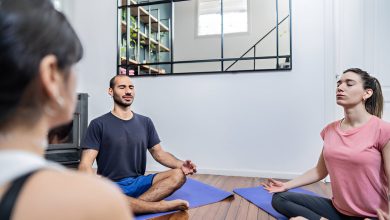Meditation for Beginners: A Practical Guide to Finding Inner Peace

Meditation is a powerful practice that has been used for centuries to cultivate mindfulness, reduce stress, and promote overall well-being. If you’re new to meditation, you may wonder how to start, what techniques to use, and how to integrate it into your daily life. This article aims to provide beginners with a clear and accessible introduction to meditation, offering practical tips and guidance to help you embark on this transformative journey of self-discovery and inner peace.
What is Meditation?
At its core, meditation is a practice that involves training your mind to focus and redirect thoughts. It often involves sitting quietly and paying attention to your breath, thoughts, or bodily sensations. The goal is to achieve a state of mental clarity, emotional calmness, and heightened awareness.
Benefits of Meditation for Beginners
- Stress Reduction: Meditation triggers the body’s relaxation response, lowering cortisol levels and reducing stress and anxiety.
- Improved Concentration: Regular meditation enhances your ability to focus and concentrate, leading to improved productivity and cognitive function.
- Emotional Well-being: Meditation cultivates mindfulness, which helps you become more aware of your thoughts and emotions. This awareness can lead to greater emotional resilience and better mood regulation.
- Better Sleep: Practicing meditation can improve sleep quality by relaxing your body and quieting your mind before bedtime.
- Physical Health: Some studies suggest that meditation may lower blood pressure, improve immune function, and reduce inflammation.
Getting Started with Meditation
1. Find a Quiet Space
Choose a quiet, comfortable space where you won’t be disturbed. It could be a corner of your home, a park, or any place where you feel relaxed and at ease.
2. Sit Comfortably
Sit in a comfortable position, either cross-legged on the floor or in a chair with your feet flat on the ground. Keep your spine straight but not stiff, allowing your body to relax naturally.
3. Set a Time Limit
Start with a short session, such as 5-10 minutes. As you become more comfortable with meditation, you can gradually increase the duration.
4. Focus on Your Breath
Close your eyes and bring your attention to your breath. Notice the sensation of the breath as it enters and leaves your nostrils or the rise and fall of your abdomen.
5. Be Present
As thoughts arise, gently acknowledge them without judgment and bring your focus back to your breath. Allow thoughts to come and go without clinging to them.
6. Use Guided Meditations
If you find it challenging to meditate on your own, consider using guided meditation apps or recordings. Guided sessions provide instructions and support to help you stay focused.
7. Practice Regularly
Consistency is key to reaping the benefits of meditation. Aim to practice every day, even if it’s just for a few minutes. Over time, you’ll notice improvements in your ability to relax and quiet your mind.
Common Challenges in Meditation for Beginners
- Restless Mind: It’s normal for your mind to wander during meditation. When this happens, gently redirect your focus back to your breath or chosen meditation object.
- Impatience: Meditation is a skill that takes time to develop. Be patient with yourself and trust that progress will come with regular practice.
- Physical Discomfort: If you experience discomfort while sitting, try adjusting your position or using cushions or props to support your body.
Types of Meditation for Beginners
- Mindfulness Meditation: Focuses on being present in the moment and observing thoughts and sensations without judgment.
- Breathing Meditation: Involves paying attention to the natural rhythm of your breath to promote relaxation and concentration.
- Body Scan Meditation: Guides you through a mental scan of your body, focusing on each part to release tension and promote relaxation.
- Loving-Kindness Meditation (Metta): Cultivates feelings of compassion and goodwill towards yourself and others, fostering emotional resilience.
Integrating Meditation into Your Daily Life
- Morning Routine: Start your day with a short meditation session to set a positive tone for the day ahead.
- Midday Break: Take a few minutes during lunch or a break to practice mindfulness and recharge your energy.
- Evening Wind-Down: End your day with a meditation session to relax your body and quiet your mind before bedtime.
Conclusion
Meditation for Beginners , Meditation is a valuable practice that can bring numerous benefits to your life, from reducing stress and improving concentration to enhancing emotional well-being and overall health. By starting with simple techniques and committing to regular practice, you can cultivate mindfulness and discover inner peace amidst the demands of daily life. Embrace meditation as a journey of self-discovery and personal growth, allowing yourself the opportunity to experience its transformative effects on your mind, body, and spirit. Begin your meditation practice today and embark on a path towards greater clarity, calmness, and well-being.


